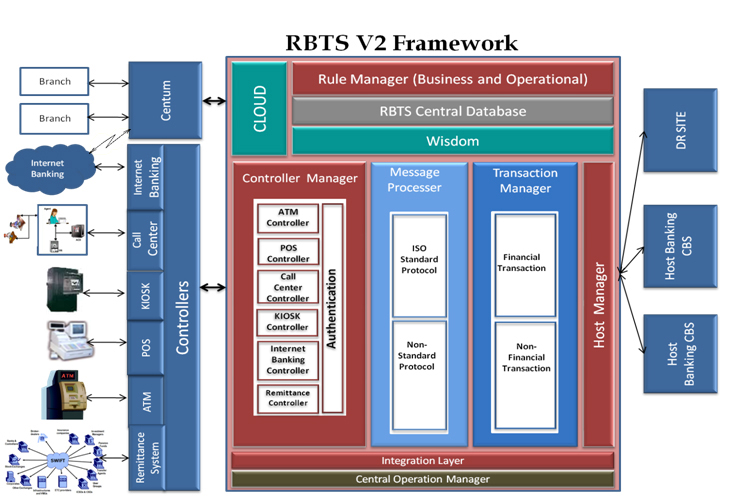|
Remote Banking Transaction Server (RBTS)
MSCL Remote Banking Transaction Server (RBTS) is a set of
integrated software modules which provides Interface to host
banking systems like MKI Equation/DBA Application to
communicate with the applications generating remote banking
transactions. RBTS can communicate in ISO8583 format or
non-ISO format. ISO8583 is a standard specification for
creating and reading financial transaction messages
including Point of Sale (POS) transactions, Automated Teller
Machines (ATM) and network-to-network, real-time financial
transactions. RBTS provides communication across these
systems using a common TCP/IP Protocol.

Click to enlarge
RBTS accepts Client requests,
interpret these messages, performs authentication of
Clients, maintains call database, sends requests to banking
applications running on Host Server and finally dispatches
host responses to the corresponding Clients. Host can be IBM
AS/400, UNIX or Windows NT based system. Following
components are integrated in RBTS:
The purpose of this DLL is to
enable non-ISO 8583 compliant applications to interface with
RBTS. This DLL resides on each local client machine running
the client application and is called from the programs
running on these machines. It communicates with RBTS that
forwards requests to the host machine for further processing
and gets response from the host. RBTS will send back the
output, received from the host, to the calling DLL. This
component is only available in RBTS Windows version. In
AS/400 version RBTS communicator handles this function.
This module receives Client
request and authenticates the client through its IP address.
It checks the format of the message and embeds Message
format type flag with message and forwards these requests to
RBTS Formatter. This module receives message from RBTS
Formatter and forward it to the Client after validating
Clients IP address. RBTS communicator records the incoming
and outgoing transactions through RBTS transaction journal.
The responsibility of RBTS
Transaction Journal is to log all transactions that will be
received by RBTS communicator. It also logs the response
that will be send to clients by RBTS communicator. This
facility provides tracing of transaction for the purpose of
audit trail and performance monitoring. RBTS transaction
Journaling is an optional activity. It can be activated
through parameter setting.
RBTS formatter is responsible
for formatting transactions in RBTS format. It receives
request from RBTS Communicator, checks the message format
type (ISO or non-ISO format) and formats it into RBTS
message format. It sends the formatted message to RBTS API
Interface. On receipt of reply from Host via API Interface,
Formatter formats the reply into message initial format (ISO
or non-ISO) and transmits it to RBTS Communicator, which
finally responds to the Client.
This module is interface
between RBTS APIs and RBTS components. It receives request
from RBTS formatter, checks the message type and sends this
request to appropriate API. It also accepts the reply from
RBTS APIs and transmits it to RBTS formatter. Interface also
stores the transactions in database through API Transaction
Journal.
This module logs transactions
as soon as they are received at RBTS API Interface. This
module records all RBTS transactions for ensuring
synchronization and transaction recovery. It also maintains
database for MIS reporting.
1.2.7 RBTS APIs
These APIs receive messages
from RBTS API Interface and pass on these messages to Host
Banking application to generate output for the requested
queries. These outputs are then made available to Host API
Interface. Depending on message type RBTS APIs communicate
with Banking Application APIs or directly access the
database where host system does not offer API facilities.
In windows version RBTS
provides facility to the customer to control the execution
mode (i.e. Batch or Interactive) of each transaction type.
Through this facility users are able to control the service
level by transaction type in-line with their corporate
strategy. In AS/400 version RBTS uses OS/400 batch facility
because of reliability and availability yet provides
performance equal to Interactive mode.
RBTS can process ATM switch
(like One-Link, M-Net) transactions. Transactions of
multiple switches can also be processed through RBTS.
Reports can be generated for reconciliation of switch
transactions.
This tool provides required MIS
reports analyzing Remote Banking Transactions. It generates
reports through RBTS API Journal. The reports can be
customized to suit client's needs.
Currently following two
versions of RBTS are available:
1) RBTS AS/400 version
2) RBTS Windows Version
- Already implemented
in a large Banks in Pakistan
|
- Support for ISO8583
and Non-ISO format transactions
|
- Simple and easy to
implement
|
|
|
- Strong local support
available
|
|
|
|
|
- Strong MIS Reporting
facility
|
- Audit trail and
reconciliation
|
|